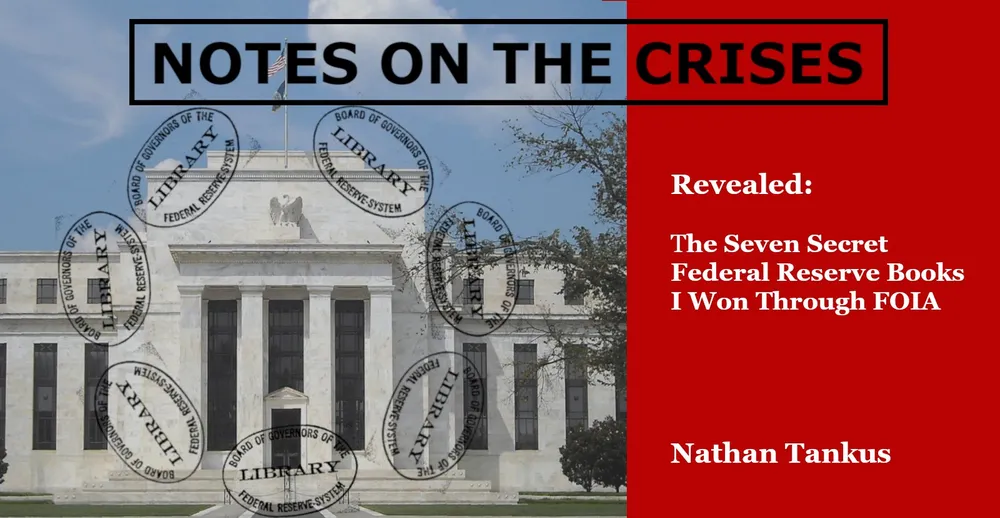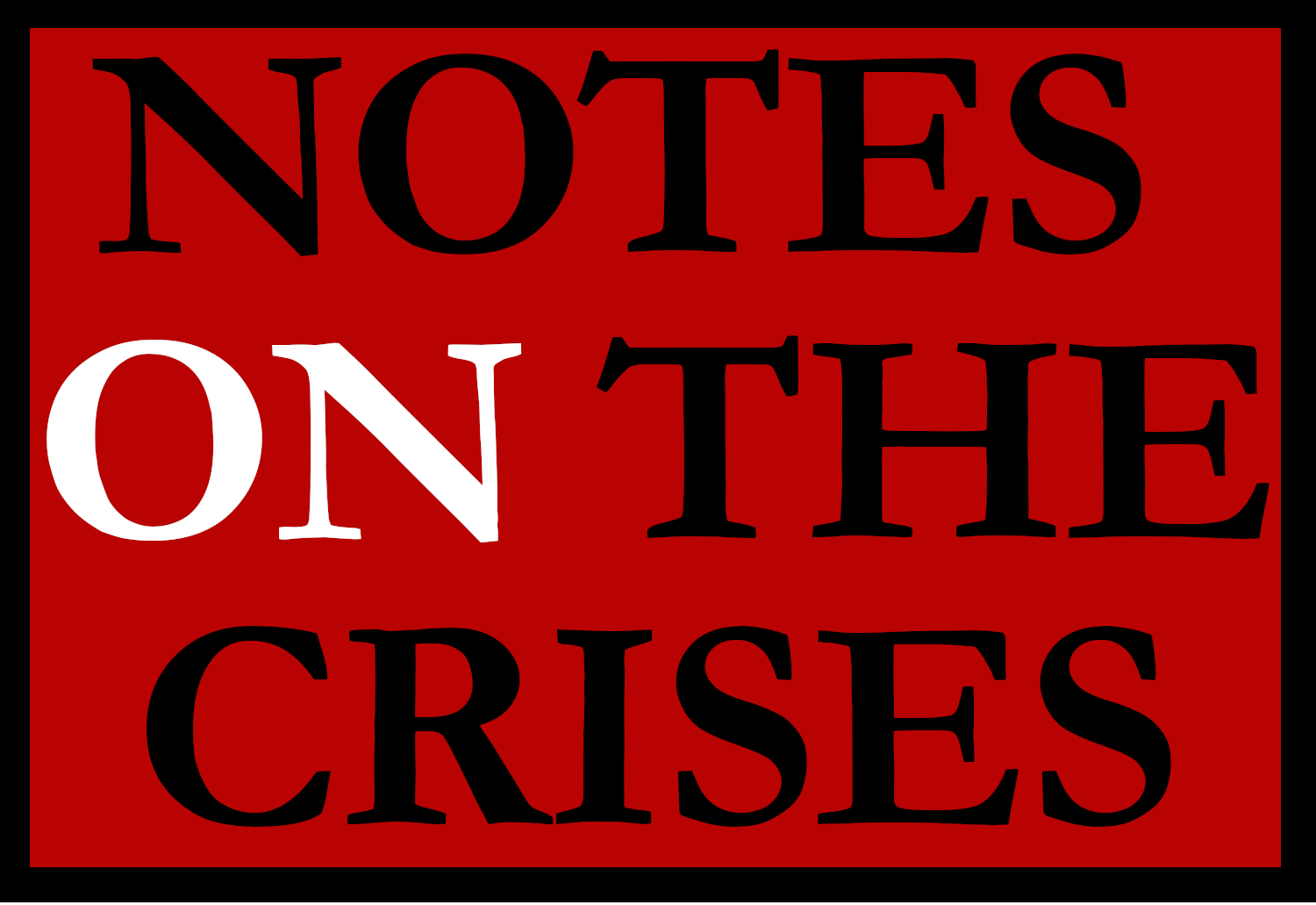Revealed: The Seven Secret Federal Reserve Books I Won Through FOIA
Nathan Tankus reveals seven secret books authored by a very important Federal Reserve general counsel that he unearthed through a Freedom of Information Act request

This is a Premium Piece of Notes on the Crises. Thank you for being a Paid Subscriber
Over the past eight months, I’ve been increasingly focusing on Freedom of Information Act Requests of the Federal Reserve System. What attracted me to this kind of work is the realization of how much material is not publicly accessible — simply because there has not been very much interest in focusing Freedom of Information Act requests on the Federal Reserve. But I’m very interested.
Since I think making this institution more well understood to the general public is important, unearthing material has both been illuminating in the short term as well as provided plenty for researchers to pick over in the future. I’m especially interested in questions around the Federal Reserve’s legal authority and legal analysis of the Federal Reserve. That’s a particular topic, which the few who have FOIAed the Fed in the past have been particularly interested in. That meant I knew I had questions that had not yet occurred to others.Nevertheless, it takes creativity to come up with requests that the Federal Reserve would actually fulfill (the question of suing the Fed is another matter!) One thing I’ve done to get inspiration for FOIA requests is look through the papers of former Federal Reserve officials at presidential libraries. Last October I was looking through the Federal Reserve Chairman Arthur Burns papers. Those are kept at the Gerald Ford Presidential Library in Ann Arbor Michigan. What piqued my curiosity from those records was a set of “monographs” with enticing titles attributed to Howard Hackley. At that point, I sent a Freedom of Information Act Request to the Federal Reserve for all of them.
Those of you who have been reading my recent output will know that I’ve been increasingly fixated on Howard Hackley. He was a longtime Federal Reserve lawyer who became General Counsel for the Federal Reserve Board, back in 1957. He stayed in that position until 1967, at which time he transitioned to an “assistant” to the Board. (He also served as legal counsel for the Federal Open Market Committee until his retirement in mid-1973.) In other words, he shepherded the Federal Reserve into the modern era. Far from a marginal figure, Hackley made many of the legal determinations that define the Fed as an institution today. Yet he hasn’t received anything like his due attention. When did he write these monographs? What did they say?
I knew they were most likely authored near the time period of Burns’s tenure as Federal Reserve Chairman. This made them especially interesting to me. That’s because I suspected that they were authored during the middle period between Hackley’s time as the Federal Reserve Board’s head lawyer and his retirement. I’ve wondered about what he was doing with this time in the past. For context, the amount of legal work lawyers at the Federal Reserve Board have is greatly multiplied relative to the FOMC. Recall that the FOMC is responsible for monetary policy. That means the legal questions it deals with are relatively small, and few entities have standing to legally challenge the FOMC’s legal opinions. This is because it's difficult to prove that you are directly impacted by the technical changes to monetary policy created by new FOMC legal decisions.
The Federal Reserve Board, by contrast, has to deal with questions of financial regulation. These questions are both complex and involve the entire financial system, meaning many entities (with large legal budgets) can potentially challenge their legal determinations. More basically, the legal oversight (measured in agency memos, reports etc.) required to keep up with the entire banking industry is staggering. This legal work also greatly increased when the Federal Reserve was given responsibility to regulate Bank Holding Companies. That happened in 1956 (a topic for another day). All that to say: the General Counsel of the Federal Reserve Board has quite a lot of work. Stepping down from Federal Reserve Board general counsel to FOMC general counsel must have felt like taking on a leisurely and relaxing job for such an experienced Federal Reserve lawyer.
Thus, it intuitively made sense to me that he spent that time writing. I already knew about a publicly available and published book on the “Lending Functions of Federal Reserve Banks” published in May 1973. Nevertheless, I was blown away when the Federal Reserve fulfilled my request in mid-December and I found 1051 pdf pages staring back at me. Thus, by number of pages, this was my most successful FOIA by far. Without further ado, here are the seven books.
Hackley 1969. Recommendations for Changes in the Federal Reserve Act
Hackley 1969. Recommendations for Changes in the Federal Reserve Act, Appendix A – Proposed Draft Bill to Revise the Federal Act
Hackley 1969. Should the Stock of the Federal Reserve Banks Be Retired?
Hackley 1970. Should Requirements with Respect to the Selection of Reserve Bank Directors Be Changed?
Hackley 1970. Should the Composition of the Board of Governors be Changed?
Hackley 1970. The Federal Reserve Advisory Council
Hackley 1971. Should the Federal Open Market Committee Be Abolished or Changed?
Hackley 1972. The Status of the Federal Reserve System in the Federal Government
Taken together, these monographs form commentary on all the most commonly discussed areas of reform regarding the Federal Reserve. Their titles straightforwardly reflect this. They are clearly the topics of reform that most commonly recurred up until that point of Federal Reserve history. For the most part, they remain the most commonly discussed topics of reform today. It is extremely useful to have Howard Hackley’s views on all of these topics assembled in this way. I would even go so far as to say that many of these reforms would likely have happened in the 1970s if Hackley’s views on these various subjects had been made public.
It’s far beyond the scope of this single piece to assess the contents of each of these monographs. However, I will make some suggestive comments. The monograph “Should the Stock of the Federal Reserve Banks Be Retired?” is extremely useful, since the false impression that Federal Reserve Banks are in any sense “private” remains to this day. The reality is that these banks are not under the control of bankers through ownership of this stock, and this book spells out why (at length). This paragraph from the monograph’s conclusion summarizes this well:
One can at least start the weighing process with two propositions generally accepted by both proponents and opponents of proposals to eliminate Reserve Bank stock. First, such stock does not give member banks any "proprietary" interest in the Reserve Banks or enable them to control the operations and policies of the Federal Reserve System. Second, the stock is not essential to the Reserve Banks from a financial point of view; whether it is desirable for other reasons is another question - the question at issue.
Another pair of documents that I think is worth highlighting is the “Recommendations for changes in the Federal Reserve Act”, and the “Appendix” containing the draft legislation being proposed. In particular, I want to focus on a particular statement that appears early on. The following quote from that section I think does a good job of capturing the Federal Reserve’s approach to legislation:
The extent to which terms used in the Federal Reserve Act should be defined in the statute presents a difficult question of judgment. It would be possible to attempt to define many words that frequently give rise to questions of interpretation, such as the words "bank", "branch", "deposit", and "capital and surplus". However, it is believed that, as a general rule, it is preferable to avoid precise statutory definitions of such terms. It is not only difficult to define terms of this kind but it is desirable to afford the flexibility provided by interpretative or regulatory definitions
[...]
For the reasons indicated, it is believed that section 1 of the Federal Reserve Act should contain, with one exception hereafter noted, only "descriptive" or "short-hand" definitions that would facilitate drafting and reference. At the same time, it would be desirable to incorporate at some place in the Act - perhaps in the section relating to the Board of Governors - a provision giving the Board general authority to define terms used in the Act in order to effectuate the purposes and prevent evasions of the Act.
Of course, there are valid reasons to think that strict statutory definitions can cause problems. The issue that tightly defining terms facilitates “evasions” of the law is well known. However, the flexibility granted in defining legislative terms also facilitates the Federal Reserve “evading” the legislative intent of congress itself. As I’ve argued in the past, the real trouble comes when the Federal Reserve is “flexible” in interpreting its own powers on behalf of some — while showing “rigidity” in interpretation on behalf of others.
In that respect, I was particularly entertained when I read through the proposed legislation, and realized that the Federal Reserve’s “emergency” lending authority was rewritten to be even more permissive than it is today. Specifically, Hackley proposes this updated language:
Any Reserve Bank may make advances in exigent circumstances to any individual, partnership, or corporation, on its promissory notes, secured to the satisfaction of the Reserve Bank, subject to such limitations, restrictions, and regulations as the Board may prescribe. [italics added]
Did you catch it? Rather than saying “unusual and exigent circumstances”, this draft bill merely says “exigent circumstances”. I plan on returning to this topic when I look back on the legacy of the SVB bank failure.
In many ways the final book is the most interesting. “The Status of the Federal Reserve System in the Federal Government” effectively served as a book length account of the Federal Reserve legal counsel’s interpretation of why “Central Bank Independence” is desirable. His perspective is more unique and complex, no doubt related to being a detailed legal analysis of the relevant issues rather than a breezy economist oriented commentary on the same issues. Reviewing the book in its entirety is beyond my scope today. However, one important element of the book is its emphasis on the lack of annual appropriations as a foundational element of the Federal Reserve’s “independence”:
One of the most significant reasons for the System's independence has been the fact that, unlike most Government agencies, it has not been dependent upon Congressional appropriations. Under provisions of the original Federal Reserve Act that have never been changed, all expenses of the Board are defrayed from assessments on the Reserve Banks which, in turn, derive their earnings principally from purchases and sales of Government securities - earnings sufficient for the expenses of the Reserve Banks as well as those of the Board
The fact that the Federal Reserve System is not subject to congressional appropriations has been a point I’ve long hammered in this newsletter — so it's nice to see one of the Federal Reserve’s premiere lawyers emphasize it himself.This is no doubt not my last word on these 1000 or so pages. Indeed, I expect to be integrating them into my future work for a longtime to come. However, I’m most excited about what other people do with these texts. I strongly suspect the research and scholarship being conducted relating to central banking (and the Federal Reserve specifically) will greatly benefit from Howard Hackley’s voluminous analysis.
Sign up for Notes on the Crises
Currently: Comprehensive coverage of the Trump-Musk Payments Crisis of 2025
